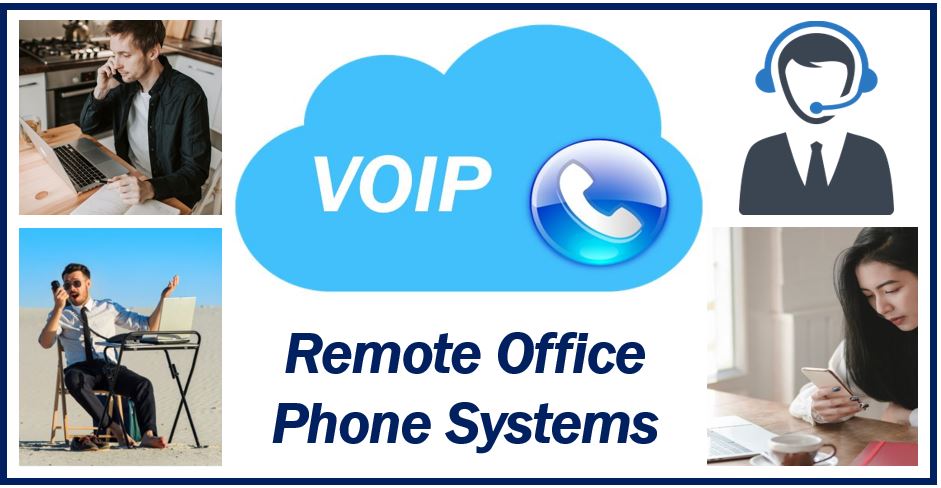At the beginning of the pandemic, countless businesses had to master an abrupt shift to distributed workforces that left them facing a plethora of challenges. One of these challenges: leaving office phones unstaffed. Customers calling would get nothing but an unsatisfactory voice message: “We’ll be back once this is over.”
The answer to this conundrum? Remote office phone systems.

Thanks to Voice over Internet Protocol (VoIP) technology, modern business telephony has shifted to the cloud. This means it is available anywhere, at any time, on any internet-enabled device.
As a result, businesses can stay reachable no matter whether team members work from a company office, or their living room couch.
In addition, VoIP phone systems offer a wide array of features to make users’ lives easier. Here are five essential functionalities that boost the productivity of remote teams.
1 – Advanced Call Management
Setting up a VoIP-powered remote office phone system gives users total control over routing, holding, or blocking incoming calls through advanced call management. Irrespective of their agents’ locations.
Businesses can set where calls get routed depending on the availability of team members. This comes in handy when they are located in different time zones, on sick leave, on holiday, or on business trips.
It’s also possible to manage calls according to caller ID. Important client calling? Let them jump the queue. Spam calls swamping your lines? Block specific IDs or all unlisted numbers.
Finally, most VoIP phone systems also include features to make queuing and holding calls more efficient. For example, traditional phone systems often leave callers languishing interminably while listening to hold music. VoIP systems make it possible instead to inform them periodically how many callers are ahead of them, and estimate how long they’ll be waiting still.
2 – Unified Communications
Modern VoIP business phone systems are, in fact, not limited to voice calls. Many systems also include live chat options, internal and external text messaging, and email.
Such unified communications platforms are a massive boon for remote teams. Rather than juggling text messages, WhatsApp, Telegram, Slack, and multiple email accounts all in different places, team members can refer to one central platform. This cuts down on the number of distracting notifications and app switching, and helps streamline the interactions of remote teams.
3 – CRM Capabilities

Another huge plus of VoIP phone systems is that many of them either offer native Customer Relationship Management (CRM) capabilities or integrate with existing CRM systems.
Calls can be seamlessly synchronized with CRM databases. They can be automatically recorded, transcribed, and filed away for future reference.
This way, crucial information on every single customer will be available for any agent to access – no matter where they are located. With this information, they can handle calls much more efficiently and in a more personalized manner.
4 – Integrations with other Platforms
In transitioning to a distributed workforce model, any team sets up an ecosystem of tools that allow for well-structured workflows. From team collaboration and project management platforms to document sharing and timekeeping apps.
Many modern business phone systems offer native integrations for any number of these platforms. Not only does this facilitate data exchange. It also allows for a smooth addition of VoIP phone systems to an existing framework of remote work tools.
5 – Native Video Conferencing
Finally, many VoIP phone systems also offer in-built video conferencing capabilities. This is a welcome relief for anyone who’s become frustrated with difficulties scheduling Zoom calls, the low quality of WhatsApp video calls, or juggling hang-ups with Google Hangouts.
Whether it’s for internal quarterly sales meetings, or important exchanges with clients and partners, stable high-resolution video calling capability is essential. VoIP business phone systems provide precisely these capabilities.
In contrast to many other videoconferencing solutions, professional VoIP systems can boast much higher audio and video quality, and unparalleled reliability. Many VoIP companies run multiple datacenters and reserve extra bandwidth to ensure calls in impeccable HD, and an uptime of 99.999% (‘five nines’).
Conclusion
VoIP business phone systems guarantee that businesses remain reachable, regardless of the work locations of team members. They also provide a wide array of valuable features to remote workforces – such as advanced call management and CRM integrations.
Considering the current trends in the pandemic, and the uncertain economic outlook, these tools, and the general flexibility and scalability of VoIP business phone systems are an undeniable advantage.
However, it varies exactly which features are offered by different providers of VoIP business phone services. That means that when choosing a business phone service, businesses need to compare carefully and decide which tools are integral to their workforces’ operations.
With the right provider, businesses can harness the power of VoIP to master this crisis – and emerge from it stronger and more efficient than ever.
Interesting related article: “What is Telecommunications?“

